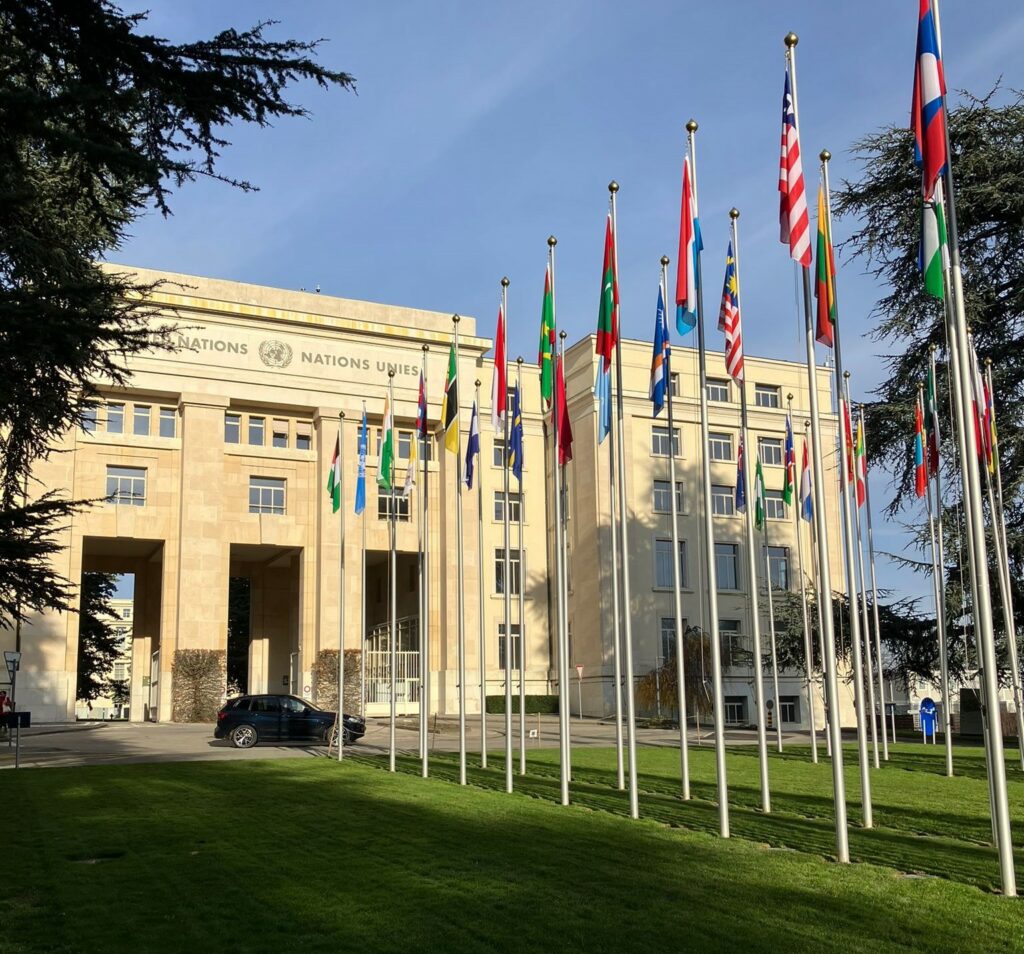Ksapa joined many of its peers of the business and human rights community at the 12th United Nations Forum on Business and Human Rights, held in Geneva from 27 to 29 November. While all eyes are already on COP 28 in Dubai, Ksapa looks back at the key takeaways from this 12th edition. The aim is to have a look at the 5 cross-cutting issues that will be at the heart of business issues in 2024.
Of course, this blog article is only a small snapshot of the lively exchanges that took place during the three days and emphasizes forward-looking themes to improve private practice with respect to human rights.
1. Operationalizing the UDHR (75th Anniversary), UNGPs and OECD Guidelines: Solid Standards in Need of More Concrete Application
- Let’s start at the beginning: 2023 marks the 75th anniversary of the Universal Declaration of Human Rights (UDHR). This document remains the bedrock of human rights around the world, and companies refer to it to identify categories of human rights. Large companies that are increasingly familiar with human rights due diligence processes are also more familiar with international standards on business and human rights, namely the United Nations Guiding Principles on Business and Human Rights (UNGPs) and the OECD Guidelines for Multinational Enterprises. However, this observation shouldn’t obscure the fact that these same large companies also need to be advised to integrate interrelated social and environmental challenges and more recent standards and laws (e.g., the Paris Agreement, the forthcoming EU CS3D, ILO Just Transition Guidelines). Nor should we forget the need for clarification on the part of many SMEs unfamiliar with the UNGP methodology.
- The Universal Declaration of Human Rights remains a strong foundation for companies and their stakeholders in a global context of polycrisis. Conflicts and economic instability increase the risks associated with the environmental emergencies of the 21st century and vice versa. On this point, the Forum emphasizes the need to advice companies in their practices in wars and conflict-affected regions.
- These recognized standards also need to be adapted to new challenges such as the growing use of technologies and AI by companies. Companies must anticipate the changes arising from AI and from the widespread digitalization of our societies, which are both creating new fields of due diligence.
- Companies are increasingly asking for concrete implementation and translation of human rights due diligence principles, standards and steps to onboard beyond the like-minded and accelerate the actual mitigation of risks already identified for years.
2. Addressing Human Rights and Environment Issues Together
- Experts are recognizing the link between human rights and environmental challenges. This nexus was addressed by a panel on “Realizing the right to a clean, healthy and sustainable environment: progress and opportunities for human rights due diligence and the environment in practice.” In this context, a public consultation is currently being launched on Human Rights Due Diligence and the Environment: Draft Guide for Business by the United Nations Development Programme.
- Just Transition was a recurring theme during the Forum. Mainly because it will be a challenge of the coming decades: ensuring that no one (especially workers) is left behind while ensuring the transition to green energies. In the industrial and extractive sectors, one of the key messages from the panelists was to be careful not to just relabel what we already know (and are not doing well) because people are already being left behind. This reinforces the need to work on human rights and social safeguards for workers while working on environmental transitions.
- Companies, for their part, need to create more transversal skills and competencies between their core functions, and as we hear more and more “break down the silos”. This is indeed a real opportunity for companies to identify and address human rights and environmental issues in an integrated way, and to combine their objectives. Fundamentally, companies need to address all environmental issues (water, biodiversity, plastic pollution, etc.) and not just GHG reduction and climate change.
3. Listening to the Voice of Human Rights Defenders and Communities
- The 12th UN Forum on Business and Human Rights brought together nearly 4000 participants, online and in person. Of these, only 2% were identified as indigenous peoples. This is a small number compared to the 32% of participants from the private sector. In general, human rights defenders or communities generally spoke in panels on ensuring access to justice and remedy. This is a good thing, as these are the people the most affected by companies’ activities. However, it also highlights the lack of participation of communities and human rights defenders in all the stages of human rights due diligence process. One panelist rightly pointed out that we rarely ask communities what they have to say about corporate policies on community engagement or human rights defenders’ policy.
- The lack of listening to and incorporating the voices of human rights defenders and communities is even more true in the larger context of mitigating climate change and adverse impacts on our planet’s boundaries. On this point, one of the panelists on “Practical Approaches to Rights-Based Climate Action for Business Enterprises” from Pacific Island countries concluded by urging Northern countries to consume less, “as it is already changing the world as we know it.”
- Companies also need to adapt their human rights due diligence processes to geographical and cultural contexts. In this regard, lessons from the MENA region have demonstrated the need to adapt human rights mechanisms to the local context, where a majority of SMEs operate and where investment is crucial, and to consider the realities of conflict-affected areas in order to adapt company responses.
4. Scrutinizing Legislation, both Expected and Confusing for Companies
- The proliferation of EU legislation on human rights and environmental due diligence legislation, together with legislation on modern slavery, and the forthcoming EU CS3D is creating a challenging debate among practitioners from different countries. How ambitious should the scope be to include companies that cause adverse human rights impacts? Would the CS3D have extraterritorial obligations for US companies? (the answer is yes, for some). Which countries have effective legal sanctions and remedies to create a law with teeth?, etc.
- The Forum also shows the need to take a step back to understand the overall impact of the EU CS3D, which will be the main instrument to address human rights and negative environmental impacts of business on people. What should we think of a law made by EU countries, when most of the impacts are happening in the South? Does it take into account the impact on SMEs at both endpoints of the value chain? These questions open the case for a UN treaty on business and human rights, which is still under negotiation.
- The proliferation of laws, with some on due diligence obligations, others on reporting, also raises the question of harmonization and of the role of the CSRD in cascading reporting obligations for EU and non-EU companies when doing business with EU companies. Finance’s growing expectations and norms for companies to respect of human rights and the environment was also a hot topic during the Forum. This finance’s – ESG – push also add an extra layer of obligations that must be translated into the operational management of companies.
5. Buzzword of the Year: Partnership
One could almost say that the need for more partnerships ran through all the panels. Co-creation, co-design, co-ownership, co-construction of tomorrow’s human rights due diligence processes. Here are four concrete operational angles for companies that Ksapa’s thought about during the Forum:
- Territorial approaches. When a company works with communities, it needs to explore territorial approaches that take into account local contextual specificities. Affected communities and indigenous peoples are at the forefront of the human rights and environmental impacts of corporate activities, and companies need to understand their territory by engaging more with them.
- Value chain approaches. When working on human rights due diligence, a company needs to examine the value chain and consider how to align the stakeholders, taking into account their roles and responsibilities and how to coordinate their actions.
- Sectoral approaches. When a company works with SMEs as a buyer (e.g., on living wage), companies work on sector-specific approaches. For example, addressing living wage issues in the textile industry is not the same as addressing living wage issues in the agricultural sector. However, companies can tailor a specific type of remediation by sector or by purchasing category.
- Level Playing Field Approach Strengthening Norms, Regulations and Standards. The issue of national regulation is about harmonizing a set of norms, standards, and laws to avoid dissonance and ensure that everyone is playing by the same rules. The legislative path is still long and complicated but it’s undoubtedly an indispensable horizon.
Conclusion
The 12th UN Forum on Business and Human Rights demonstrates the need to adapt standards and tools to different actors. While multinational companies are more mature in their human rights due diligence processes, SMEs, which represent the majority of companies worldwide, still need to embrace human rights without suffering under the weight of growing obligations. In any case, given the proliferation of standards, norms and challenges, simplification will remain the answer to engage companies of all sizes and enable real change – cooperation will lead the way.






